
Thomas Keneally
The following novels constitute the shortlist for the 1982 Booker Prize:
Notable Omissions from the 1982 Shortlist

|
Schindler's Ark Thomas Keneally |
Dustjacket synopsis:
"In the shadow of Auschwitz, a flamboyant German industrial grew into a living legend to the Jews
of Cracow. He was a womaniser, a heavy drinker and a bon viveur, but to them he was a
saviour.
"This is the story of Oskar Schindler who risked his life to protect beleaguered Jews in Nazi-occupied Poland, who continually defied the SS, and who was transformed by the war into a man with a mission, a compassionate angel of mercy."
Quotes:
"A extraordinary achievement" - Graham Greene
"Brilliantly detailed, moving, powerful and gripping" - The Times
"A magnificent book, powerful, harrowing and beautifully written" - Sunday Express
"Swift, cool and brilliantly succesful" - Books and Bookmen
"Thomas Keneally has done marvellous justice to a narvellous story" - Sunday Times
"Keneally is a superb storyteller. With Schindler's Ark he has given us his best book yet,
a magnificent novel which held me from the first page to the last" - Alan Sillitoe
First Paragraph:
In Poland's deepest autumn, a tall young man in an expensive overcoat, double-breasted dinner jacket beneath it and - in the lapel of the dinner jacket - a large ornamental gold-on-black enamel swastika, emerged from a fashionable apartment block in Straszewskiego Street on the edge of the ancient centre of Cracow, and saw his chauffeur waiting with fuming breath by the open door of an enormous and, even in this blackened world, lustrous Alder limousine.
"Watch the pavement, Herr Schindler," said the chauffeur. "It's icy like a widow's heart."
From the Coronet paperback edition, 1983.
You can read further details of this and other novels by Tom Keneally on this webpage.
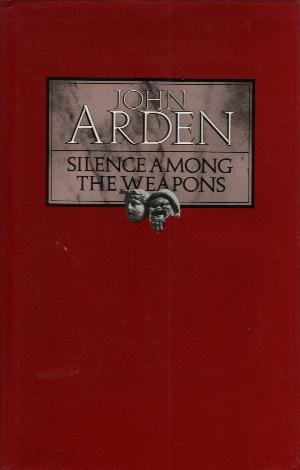
|
Silence Among the Weapons John Arden |
Dustjacket synopsis:
"Silence Among the Weapons is Arden's first work of fiction after more than two decades of writing for the stage.
It is a picaresque novel in the classic tradition of English Literature, owing something to Defoe and Fielding in its
use of a more or less ordinary central character - in this case an actor's agent - who gets caught up in more or less
extraordinary events; in this case the expanionist activities of the Republic of Rome in the first century B.C.
"Following his hero's adventures across half the known world from Asia Minor to the very heart of Rome itself, Arden allows us vivid glimpses of a world in turmoil under the heel of colonial ambition and of the furious resistance that this has aroused amongst the subject peoples. By turns comic, satiric and horrific, but always sure-footed in its effects, it is difficult to believe that this brilliant book is in fact a first novel."
First Paragraph:
What he actually said - his exact words, I have been told, in his own thunderous language - the blood-fouled old general, seven times consul, Gaius Marius the Mule-driver, staggering in the last malodorous days of his last term of office, from his bed to the latrine on swollen septic feet to heave out his bowels - his life indeed, the undigested indigestible gobbets of his failed ambition - from both ends at the same time (and most of it spattered on his heels or his nightshirt before he could get there, according to his doctor - who ever heard these days of a discreet doctor? They tell everything to everyone these days in case someone accuses them of poisoning people) - his exact words were as follows: 'Inter Arma Silent Leges': 'Once the weapons are out, the laws fall silent.' And by god so they do.
From the Methuen hardback edition, 1982.
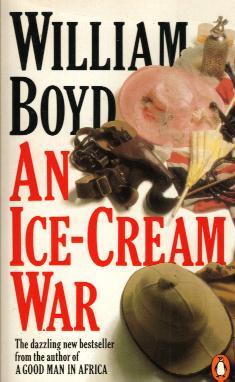
|
An Ice-Cream War William Boyd |
Dustjacket synopsis:
"As millions are slaughter on the Western front, a ridiculous and little-reported campaign is being waged in East Africa -
a way they continued after they Armistice because no one told them to stop.
"Primarily a gripping story of the men and women swept up by the passions of love and battle, William Boyd's magnificently entertaining novel also elicits the cruel futility and tragedy of it all."
Quotes:
"A towering achievement" - John Carey, Chairman of the Judges of the 1982 Booker Prize, for which this novel was nominated.
"Quite outstanding" - Claire Tomalin, Sunday Times
"Here come the brave, the foolish, the blundering and the baffled...this brilliantly constructed story balances on
seesaws of innocence and violence, sanity and lunacy, hilarity and horror" - The Times
"Funny, assured and exapnsively told, a seriocomic romp. But it's also something maturely more...a study of people caught
in the side pockets of calamity that dramatizes their plights with humour, detail and grit" - Harper's
First Paragraph:
6 June 1914,
Dar-es-Salaam, German East Africa
'What do you think would happen,' Colonel Theodore Roosevelt asked his son Kermit, 'if I shot an elephant in the balls?'
'Father,' Kermit said, keeping a straight face. 'I think it would hurt a great deal.'
The colonel roared with laughter.
Temple Smith smiled at this exchange as he supervised the unloading of the horses and equipment. The colonel and his son were sitting on the bench above the cowcatcher at the very front of the train. Temple couldn't see them, yet he heard their conversation as clearly as if they were standing alongside. It must be, he reflected, some trick of the atmosphere, the stillness and dryness of the air.
From the Penguin paperback edition, 1983.
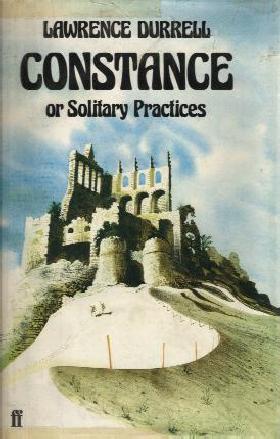
|
Constance or Solitary Practices Lawrence Durrell |
Dustjacket synopsis:
"The party is over, and the world is in the throes of the 1939-45 war, but the story continues as patterns set in
Monsieur and Livia are developed against a background which shifts between Cairo, Geneva and Avignon.
"The idyllic last summer of Livia seems now forever in the past, like some lost Garden of Eden ... but figures from other times and other places loom up - sometimes disconcertingly - in the twilight zone between the real and imagined worlds: Constance herself, professionally expert in Freudian analysis, but discovering passion for the first time; her tragic, doomed sister Livia; the mercurial Prince Hassad; shaggy, lumbering Rob Sutcliffe, who here at last comes face to face with his creator, Aubrey Blanford, in a significant encounter.
"Constance is the third to appear of Lawrence Durrell's quincunx of novels, and in it he takes one stage further his exploration of the relationships between the novelist and his medium, and between his characters and the themes upon which they are variations. As the design of the whole work becomes clear its characteristic qualities of expression and structure suggest an artistic achievement likely to match that of The Alexandria Quartet, with which the time scheme and the Egyptian sequences of the present volume form a link. Certainly the pleasures offered to the reader, new to the work or not, match the reputation of its author."
First Paragraph:
In the beginning the two tall gate-towers of medieval Avignon, the Gog and Magog of its civic life, were called Quiquenparle and Quiquengrogne. Through them the citizens of this minor Rome passed by day and night, just as memories or questions or sensations might pass through the brain of some sleeping Pope. The clappers of the great belfries defied the foul fiend with their rumbling clamour. The shivering vibrations fanned out below them, thinning the blood to deafness for those in the street. It was quite a different matter when the tocsin sounded - it made a gradually increasing roar such as a forest fire might do, or else sounded like the vicious hum of warlike bees in a heating bottle. He had lived so long with them as history that now, half-starved as he was, the very war sirens seemed to resemble them. After the tremendous beating he had endured - to the point of unconsciousness - he had been thrown into a damp cell in the fortress and attached to the wall with such science that he could not completely lie down, for they had hobbled his neck to a ring in the wall, as well as pinioning his elbows. Quatrefages had now reached a stage of blessed amnesia when all his various aches and pains had merged into one great overwhelming distress which elicited its own anaesthesia. He had subsided in ruins on the floor, and leaned his head against the wall; but the rope was just short, by intention. The pressure on his carotid, in a paradoxical sort of way, kept him from going out altogether. He heard the soft rumbling of military vehicles as they mounted the cobbled slope and rolled down into the garrison square; the rubber wheels slithered and the engines roared in and out of gear. For him it was as if a long line of knights were riding away by torchlight upon some heroic Templar adventure; the garble of horses' hooves upon the cobbled drawbridge bade them goodbye. A sort of vision, born of his fatigue and pain, allowed him to delve into the real subject-matter of his life - for it was he who was documenting the Templar heresy and hoping to run down clues as to the whereabouts of the possibly mythical treasure. Now he had fallen into the hands of the new Inquisition, though the priests of the day wore field-grey and bore swastikas as badges and amulets. With them death had come of age. So this was to be the outcome of his long search - to be tortured to reveal secrets he did not possess! When he laughed in a desperate hysteria they had smacked him across the mouth, knocking his teeth into his throat. But all this came much later....
From the Faber and Faber hardback edition, 1982.
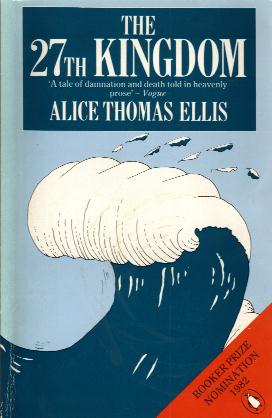
|
The 27th Kingdom Alice Tomas Ellis |
Dustjacket synopsis:
"The 27th Kingdom is to be found in Chelsea, where Aunt Irene lives in a cosy, cluttered ménage with Kyril, her nephew.
Their peace, however, is about to be invaded by Valentine, a young postulant sent by her Reverend mother to 'test her
vocation'..."
Quotes:
"A tale of damnation and death told in heavenly prose" - Vogue
"Alice Thomas Ellis weaves an enthralling, imaginative drama, buttonholing her readers with an insistent wit and
vigour...this new novel builds to a climax which seems the result of delighted, diabolical mischief-making" - Observer
"She brings the malicious observation of Muriel Spark to the farcical situations of Saki...short, sharp and sparklingly
malicious" - Spectator
"It is this marriage of the sacred and the profane, the real and mythic, the profound and lighthearted that makes this
novel a minor masterpiece" - Literary Review
First Paragraph:
The story I shall tell begins like this.
Once upon a time, in the year of Our Lord 1954, a woman known as Aunt Irene, who insisted on being pronounced 'Irina' and spelled as I have spelled her, received a letter. It was headed 'The Feat of Blessed Julie Billiart'. Enclosed in its folds was a card with a picture on it of a nice old lady in a wimple, beaming.
Aunt Irene found it irritating. She herself possessed a number of icons, but they represented proper saints, correctly dressed with haloes, long-robed mussel-shell-shaped thighs and angular fingers raised in benediction. Moreover her sister had probably despatched this portrait of a Blessed old girl as a reproach, a reminder; for she feared that Aunt Irene was backsliding, and frequently wrote to say so.
From the Penguin paperback edition, 1982.
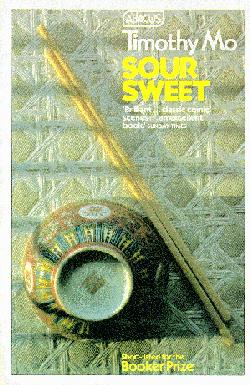
|
Sour Sweet Timothy Mo |
Dustjacket synopsis:
"At the centre of 60s London the busy Chinese community lives by its own precise and violent rules,
flourishing like a spiky, brilliant crystal garden in the murky waters of Soho. Pitched into an
alien city which is neither hostile nor friendly but very strange and very foreign, the Chen
family prospers by deftly and sometimes incongruously blending tradition and opportunity. But
no private family lives beyond the reach of the largest and most powerful Chinese 'family' - the
Triads.
"Mixing pungent humour with sharp insights into the workings of closed societies, Sour Sweet is a richly intriguing and finely written novel by an unusually talented author."
Quotes:
"Uncovers a vivid, densely populated city within the city, whose inhabitants have an
individuality and energy that makes the surrounding English look very grey. More than a touch
of early Dickens...has a flavour all of its own" - Observer
"Adopting the severe approach of a French 19th-century novlist, Timothy Mo has drawn an amazing
picture of Chinese living in London." - Sunday Times
"The characters and atmosphere in Sour Sweet are entralling, and Mo has a
deliciously gingery sense of humour." - The Listener
"Excellent...beautifully plotted, lively, deft and touching." - The Times
"In Sour Sweet Timothy Mo has brilliantly combined the comic with the frightening." - Daily Telegraph
First Paragraph:
The Chens had been living in the UK for four years, which was long enough to have lost their place in the society from which they had emigrated but not long enough to feel comfortable in the new. They were no longer missed; Lily had no living relatives anyway, apart from her sister Mui, and Chen had lost his claim to clan land in his ancestral village. He was remembered there in the shape of the money order he remitted to his father every month, and would truly have been remembered only if that order had failed to arrive.
From the Abacus paperback edition, 1983.
Notable Omissions from the Shortlist:
"Union Street", Pat Barker
"Providence", Anita Brookner
"On the Black Hill", Bruce Chatwin
"A Boy's Own Story", Edmund White
This page and its contents are copyright © 2002-05 by Perry Middlemiss, Melbourne, Victoria, Australia.
Last modified: October 24, 2005.